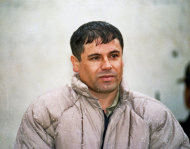
June 10, 1993
The U.S. Treasury Department called Mexican drug lord Joaquin "El Chapo" Guzman "the world's most powerful drug trafficker" Tuesday. The fugitive Sinaloa cartel leader also got a boost from Mexican actress Kate Del Castillo, who said she believed in Guzman more than in the government.
It was the latest in an odd series of encomiums for Guzman, who was included this year on the Forbes list of the world's richest people, with an estimated fortune of $1 billion.
The U.S. Embassy in Mexico City issued a statement saying three of Guzman's alleged associates had been hit with sanctions under the drug Kingpin Act, which prohibits people in the U.S. from conducting businesses with them and freezes their U.S. assets. The two Mexican men and a Colombian allegedly aided Guzman's trafficking operations.
The statement quoted Adam J. Szubin, director of the Treasury Department's Office of Foreign Assets Control, as saying the move "marks the fourth time in the past year that OFAC has targeted and exposed the support structures of the organization led by Chapo Guzman, the world's most powerful drug trafficker."
Guzman, who escaped from a Mexican prison in 2001 in a laundry truck and has a $7 million bounty on his head, has long been recognized as Mexico's most powerful drug capo. Authorities say his Sinaloa cartel has recently been expanding abroad, building international operations in Central and South America and the Pacific.
Results of a turf war between the Sinaloa and Juarez cartels
- Ciudad Juarez, 2009
Del Castillo, who played a female drug trafficker in the TV series "La Reina del Sur" ("Queen of the South"), offered grudging praise for Guzman in a posting Tuesday on the social media site Twextra, linked to her Twitter account.
"Today, I believe more in El Chapo Guzman than in the governments who hide truths from me," she wrote.
The actress did not specify whether she was referring to the Mexican government, or what she meant when she accused "governments" of "hiding the cures for cancer, AIDS, etc. for their own benefit and enrichment."
Del Castillo's publicist, Marianne Sauvage, confirmed in an email to The Associated Press that the actress wrote the posting, and that the account belonged to Del Castillo.
The 800-word posting ended with an impassioned plea to Guzman:
"Mr. Chapo, wouldn't it be great if you started trafficking with positive things? With cures for diseases, with food for street children, with alcohol for old people's homes so they spend their final days doing whatever they like, trafficking with corrupt politicians and not with women and children who wind up as slaves?"
"Go ahead, dare to, sir, you would be the hero of heroes, let's traffick with love, you know how," the message concluded.

Mexican actress Kate del Castillo
Also Tuesday, Mexican authorities said they had seized 32.6 metric tons of a precursor chemical used to make methamphetamines at the Pacific coast port of Manzanillo.
Mexico's navy said the chemical methylamine came in a shipment from China, but did not say whether Manzanillo was the final destination of the shipment. Mexico seized almost 675 metric tons of the chemical at sea ports in December alone, all of which was destined for Guatemala.
Experts say that when another chemical is added, methylamine can yield its weight in uncut meth.
Also Tuesday, federal police reported they had defused a car bomb left outside the state detectives' agency offices in Ciudad Victoria, the capital of the northern border state of Tamaulipas.
After detectives reported the car smelled of gasoline, specially equipped federal officers opened the trunk and found 10 sticks of explosives, two jugs of gasoline, wires, a cellphone and what appeared to be detonating devices.
There was no immediate information on who left the car bomb.
Tamaulipas has been the scene of bloody turf battles between the Gulf and Zetas drug cartels, and the gangs have attacked police and police offices with car bombs in the past.
Via AP
No comments:
Post a Comment